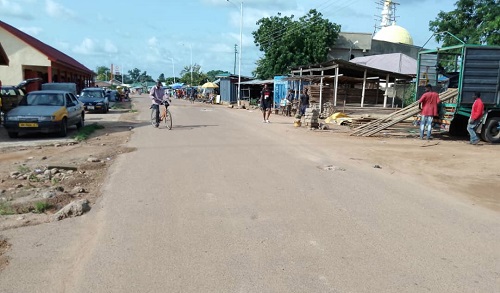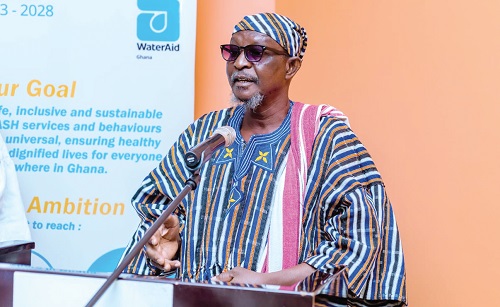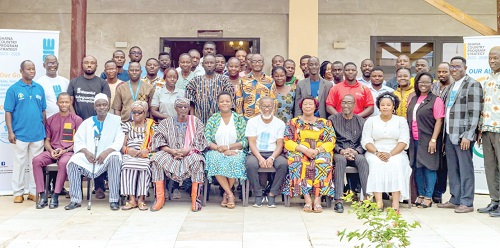
High fluoride content in Bongo water: 84,000 Residents suffer bone infections, discoloured teeth
More than 70 per cent of the adult population in the Bongo District in the Upper East Region are suffering from bone-related infections and discoloured teeth due to the high content of fluoride in the drinking water of the area.
The problem has persisted in the district since it was created, and the people have lived with it till today. The situation has not only affected male and female adults but children as well.
The 2021 Population and Housing Census puts the estimated population in the district at 120,254, made up of 56,920 males and 63,334 females.
If this figure is anything to go by, then about 84,177 people in the district, including children, are currently living with the health conditions brought about by the high fluoride content in their water.

The Paramount Chief of the Bongo Traditional Area, Naba Baba Salifu Atamale Lemyaarum, who brought the plight of the people in the area to light, said once the blood levels of the people were unable to overcome the fluoride in the water they drank daily, as they approached 60 years, they would become susceptible to knee and bone-related infections.
Dissemination meeting
Naba Lemyaarum was speaking during a sub-national dissemination of WaterAid Ghana’s new country strategy programme in Bolgatanga in the Upper East Region last week Thursday.
The event brought together stakeholders of beneficiary districts in the region, namely Kassena Nankana and Builsa North municipalities, and Kassena Nankana West, Bawku West, Tempane, Binduri and Bongo districts.
In May this year, WaterAid Ghana launched a new five-year country programme strategy to achieve sustainable and inclusive Water, Sanitation and Hygiene (WASH) services in the country.
The strategy, spanning 2023-2028, is aimed at reaching one million people directly and four million people indirectly with sustainable, safe and inclusive WASH behaviour in 10 focused districts of the Upper East and Upper West regions and has a particular focus on the Bongo District.
Naba Lemyaarum noted that the high fluoride level situation had caused harm to the people as they had no option but to live with the disease and other health conditions for the rest of their lives, saying “I am even a victim of the disease as I stand before you”.
“Due to the condition, I find it very difficult to squat and get up since I have to contend with knee problems over the years, coupled with discolouration of my teeth,” he said.
He added that it was this challenge in the area that attracted WaterAid to pay attention to the district in their new strategy to help tackle the problem and other sanitation-related issues.

The paramount chief, who was concerned about the plight of his people, pledged his utmost support towards the full implementation of the strategy in the district to bring relief to the thousands of residents, stressing, “As the chief, I am committed to the rollout of the strategy to ensure that people enjoy healthy and better lives”.
He challenged the staff of the beneficiary district assemblies not to pay lip service to the strategy but to see to its effective implementation since it involved huge money.
He warned that he would not take it kindly if the objectives of the strategy were not achieved in the district, which was the main focus of the five-year intervention.
Community members
Some community members who spoke with the Daily Graphic said the situation they found themselves in continued to negatively impact socio-economic activities as it warded off potential investors from the district.
They said currently, there were no options for the people in terms of their source of drinking water so they continued to drink from boreholes with high fluoride content.
Some of the community members expressed worry about the situation and urged the government to take conscious steps to ensure that they were provided with good and safe drinking water for their domestic and economic use.
“It is very disturbing that some of us have to live with discoloured teeth and other medical conditions for the rest of our lives as a result of the water that we drink daily,” they said.
To save residents of some rural communities, institutions and benevolent individuals who drill boreholes but later realise the high fluoride content after testing immediately lock them to prevent the local people from using them.

Residents of the communities who are provided boreholes with the water containing the substance are often forced to use it or walk for a long distance to nearby borehole points to fetch water.
Unfortunately, the Vea Water Treatment Plant, which is located in the district, supplies water to Bolgatanga and its environs but not Bongo, leaving the people in the area to their own fate.
The Bongo District is well-noted for farming with farmers engaging in the cultivation of crops, such as vegetables and rice. Others are also engaged in trading, handicrafts and a recent addition, mining.
Share contents
The Country Director of WaterAid Ghana, Ewurabena Yanyi-Akofur, said the event was to share with stakeholders the contents of the new strategy to enable them to embrace the path that was ahead.
She said the mission was to secure and normalise safe and sustainable decent toilets and good hygiene for every person nationwide, noting
“We are embarking on what would reshape the narrative of health dignity and prosperity in the beneficiary regions”.
While recognising the contributions of all stakeholders, including the government, development partners, media and academics, among others, she indicated, “It is a testament to our collective resolve that we can drive systematic change that far exceeds the sum of our individual contributions”.
She called for unity and shared responsibility among stakeholders to overcome challenges that might arise, such as climate change, urbanisation and resource scarcity.
WaterAid’s strategy
WaterAid Ghana’s new five-year country strategy, with a special focus on Bongo District, aims to ensure that there is universal access to sustainable safe, inclusive and climate-resilient WASH so that lessons can be replicated in other areas.
In the Bongo District, it would support achieving and maintaining its vision of universal access to WASH by strengthening long-term partnerships, as well as working together to make significant progress in delivering universal access to WASH for 120,000 by 2028.
In a welcome address, the Upper East Regional Minister, Stephen Yakubu, charged the Municipal and District Chief Executives (MDCEs) in the beneficiary districts to provide the needed leadership and support to ensure the smooth implementation of the strategy so it inured to the benefit of all.
The District Chief Executive (DCE) for Bongo, Rita Atanga, in a remark, admitted that open defecation was rife in the area and pledged to provide the needed support to ensure the successful implementation of the strategy in the area.
Writer’s email:
